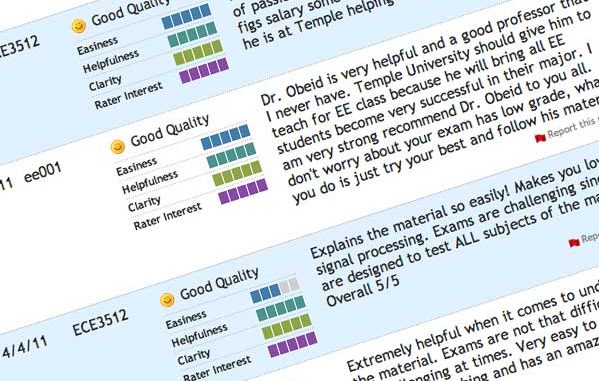

As spring semester begins, students adjust to new schedules, classes, workloads and — of course — professors. Students, on the surface, have several ways of obtaining information on the classes they sign up for, through both Temple’s course handbook as well as online course descriptions that offer insight into the scope of the class. On top of that, the many factors that play into choosing a class are overwhelming: general education and major requirements, availability and prerequisites, and most of all, choosing the best professor.
An Internet site created specifically for that purpose, RateMyProfessors.com, is used by college students, especially when it comes time to register for a new semester and during the drop period when students realize their professors may not be the right match for them.
The website is set up so that students can search from the main page for a list of professors that have been rated by previous students. Each rating consists of three categories: helpfulness, clarity and easiness, which combine to create an overall rating. The fairly vague categories can each be given a number ranging from one to five, with five signifying optimal performance. In addition, professors can be awarded a chili pepper — a reflection of students’ opinions on the professor’s physical attractiveness.
Though it has taken a different form, sharing opinions on a professor with other students is not a new phenomenon.
Mark Leuchter, a Temple professor who has taught courses such as religion in the world, said while some poor ratings can be disheartening, those who go into academia should, and typically do, understand that they can’t please everyone, and expect some less positive opinions.
“Before the Internet, there were student newspapers with ratings for professors,” Leuchter said. “I don’t think that RateMyProfessors came out of nowhere, but just because it came from an older tradition doesn’t mean it’s totally honest.”
Leuchter suggested students treat the site lightly, saying it can be useful, but those who read ratings should remember that Internet trolling is present, as it is everywhere online. In addition, the site often reflects extreme opinions, as Leuchter noted when he said many students who got a good grade in a class without much work tend to give a glowing review.
Honors adviser and professor Amanda Neuber said that while RateMyProfessors can certainly be useful, it must be regarded carefully.
“Look at it knowing the information is already biased,” Neuber said. “You have to read between the lines [in each rating]. Some students who got a bad grade use RateMyProfessors to vent.”
The site’s middle-of-the-road ratings, between about three and four, are typically those of professors with the highest number of ratings, allowing differing ratings to equal out. There are certainly well-liked professors who manage to maintain high ratings with more than 10 or 15 reviews, but most with dismal scores have very few ratings.
“The most authoritative thing is the student feedback forms,” said Iyad Obeid, professor in the engineering department. “I might get 50 student feedback forms, and I don’t get many ratings on RateMyProfessors.”
Though Obeid has more than 10 ratings, placing him well ahead of many of his fellow instructors, ratings often reflect the number of contributing students. The motivational factor for posting a rating on the site must be considered when reading a professor’s review.
Some professors are exceptionally light-hearted about the site, including one Mosaic professor who, Michael Hyer, a freshman kinesiology major, said he has for his first Mosaic course this semester.
“My Mosaic professor told us today, ‘I search myself on Google to see what people say on RateMyProfessors.com,’” Hyer said. “‘They said I was easy and fun. And now if only I got the hot chili pepper I’d be the perfect date.’ Everyone thought it was funny.”
As a student who has used the site, Hyer said that he thought his professor’s attitude was “laidback and cool,” and that the class appreciated his humorous take on the site.
Not all professors are unfazed by the content on RateMyProfessors — the chili pepper in particular is an issue of discomfort. Leuchter notably remembered a past conference during which professors could attend a session specifically on how to cope with ratings and deal with students disregarding appropriate boundaries on RateMyProfessors.
Though clearly a relevant topic for many of his colleagues, Leuchter said he did not find the session necessary.
A student with conservative values who disagreed with Leuchter’s historical representations of the Bible, and criticized the course before doing even one assignment, submitted a comment that Leuchter said he flagged for removal.
Obeid also said that sometimes only one professor teaches a certain course at a time — a situation he has been in himself — and that students ultimately should decide on a course because of the material, not the professor.
“I also usually do more research on Google of the professor because I like to know what their background on the subject is,” said Semina Badnjevic, a senior public health major.
RateMyProfessors may be a quick way to look up a professor when trying to compile next semester’s schedule, but most students and faculty agree that it should not, by any means, be the ultimate decision-making influence.
“Can you get an idea about a professor? Probably. But don’t believe every word you read,” Neuber said.
Erin Edinger-Turoff can be reached at erin.edinger-turoff@temple.edu.


Be the first to comment